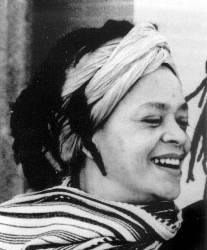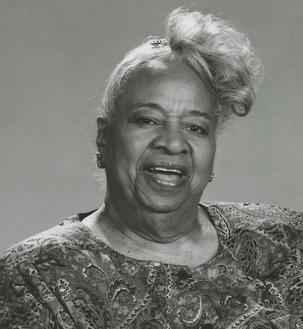Related Research Articles

Toni Cade Bambara, born Miltona Mirkin Cade, was an African-American author, documentary film-maker, social activist and college professor.

Vito Anthony Marcantonio was an American lawyer and politician who served as the socialist leader of East Harlem for seven terms in the United States House of Representatives.

The Progressive Labor Party (PLP) is an anti-revisionist Marxist–Leninist communist party in the United States. It was established in January 1962 as the Progressive Labor Movement following a split in the Communist Party USA, adopting its new name at a convention held in the spring of 1965. It was involved in the anti-Vietnam War movement of the 1960s and early 1970s through its Worker Student Alliance faction of Students for a Democratic Society.
Wyatt Tee Walker was an African-American pastor, national civil rights leader, theologian, and cultural historian. He was a chief of staff for Martin Luther King Jr., and in 1958 became an early board member of the Southern Christian Leadership Conference (SCLC). He helped found a Congress for Racial Equality (CORE) chapter in 1958. As executive director of the SCLC from 1960 to 1964, Walker helped to bring the group to national prominence. Walker sat at the feet of his mentor, BG Crawley, who was a Baptist Minister in Brooklyn, NY and New York State Judge.

The Progressive Socialist Party of Ukraine (PSPU) is a banned, pro-Russian political party in Ukraine led by Nataliya Vitrenko. The party was represented in Ukraine's national parliament between 1998 and 2002. The party is considered neo-communist and wants to restore state ownership of industry and workers' democracy in Ukraine. Due to ideological ties to Dugin, it has also been described by some observers as being National Bolshevik.
William Lorenzo Patterson was an African-American leader in the Communist Party USA and head of the International Labor Defense, a group that offered legal representation to communists, trade unionists, and African Americans in cases involving issues of political or racial persecution.

Louise Alone Thompson Patterson was a prominent American social activist and college professor. Patterson's early experiences of isolation and persecution on the West Coast had a profound impact on her later activism. She recognized the ways in which racism and discrimination affected individuals and communities and dedicated her life to challenging these systems of oppression. Her involvement in the Harlem Renaissance, a period of intellectual and cultural awakening in African American communities, allowed her to connect with other artists and activists who were similarly committed to social justice. In addition to her notable contributions to civil rights activism, Thompson Patterson was also recognized as one of the pioneering Black women to be admitted to the University of California at Berkeley.

James W. “Jim” Ford was an activist, a politician, and the vice-presidential candidate for the Communist Party USA in the years 1932, 1936, and 1940. Ford was born in Alabama and later worked as a party organizer for the CPUSA in New York City. He was also the first African American to run on a U.S. presidential ticket (1932) in the 20th century.
The Council on African Affairs (CAA), until 1941 called the International Committee on African Affairs (ICAA), was a volunteer organization founded in 1937 in the United States. It emerged as the leading voice of anti-colonialism and Pan-Africanism in the United States and internationally before Cold War anti-communism and liberalism created too much strife among members; the organization split in 1955. The split was also precipitated by co-founder Max Yergan's abandonment of left-wing politics; he advocated colonial rule in Africa.

Williana "Liana" Jones Burroughs was an American teacher, communist political activist, and politician. She is best remembered as one of the first women to run for elective office in New York.
Sandy (Alexandra) Pollack (1948–1985) was an American Communist activist. She is best known for her involvement in the founding of the Committee in Solidarity with the People of El Salvador (CISPES), which was the focus of two highly controversial FBI investigations. One addressed possible violations of the Foreign Agents Registration Act (FARA), in which her personal contact with Farid Handal, brother of Salvadoran Communist leader Shafik, was called into question. The other concerned alleged tangible support of terrorist activities perpetrated by or on behalf of the Frente Farabundo Martí para la Liberación Nacional, FMLN and Frente Democrático Revolucionario FDR under the guise of international solidarity. The first case was dropped for lack of evidence. She was killed in a plane crash before the second case was settled.
Barbara Ann Teer was an American writer, producer, teacher, actress and social visionary. In 1968, she founded Harlem's National Black Theatre, the first revenue-generating black theater arts complex in the U.S.
Edith Segal was a Jewish-American choreographer, dancer, poet and songwriter.

Frances Elizabeth Williams was an American actress, activist, theatre producer, organizer, and community worker. Williams was the first black woman to run for the California State Assembly in 1948 on the Progressive Ticket and served on the boards of the Screen Actors Guild, Actors' Lab, and Actors Equity. She represented the World Peace Council at the first Angola Independence Celebration in 1975, and co-founded the Art Against Apartheid Movement in Los Angeles in the 1980s.

Sojourners for Truth and Justice was a radical civil rights organization led by African American women from 1951 to 1952. It was led by activists such as Louise Thompson Patterson, Shirley Graham Du Bois and Charlotta Bass.

Victoria Garvin was an American political activist, Pan-Africanist, and self-described working class internationalist. While growing up in a working-class family during the height of the Great Depression, Garvin was exposed early on to the realities of both proletariat and racial exploitation. Garvin became a prominent organizer in the Black Left during the height of McCarthyism, before traveling to Nigeria, Ghana, and China. In Ghana, Garvin was a member of a committee who received Malcolm X and created his itinerary, since Garvin had previously met him in Harlem. As a lifelong activist and radical intellectual, Garvin created direct links between Black Power politics, Pan-Africanism, and Third World liberation.

Gerri Major (1894–1984) was an African-American woman who lived in Harlem during a career that stretched from the 1920s through the 1970s. She was successful in a number of overlapping vocations, including journalist, editor, newscaster, publicist, public health official, author and community leader. An article celebrating her 80th birthday stated that "Gerri was definitely one of the 'new Negroes' of the early 20th Century," adding that by the end of the 1930s she had become "one of the best known black women in America."

Freedom was a monthly newspaper focused on African-American issues published from 1950 to 1955. The publication was associated primarily with the internationally renowned singer, actor and then officially disfavored activist Paul Robeson, whose column, with his photograph, ran on most of its front pages. Freedom's motto was: "Where one is enslaved, all are in chains!" The newspaper has been described as "the most visible African American Left cultural institution during the early 1950s." In another characterization, "Freedom paper was basically an attempt by a small group of black activists, most of them Communists, to provide Robeson with a base in Harlem and a means of reaching his public... The paper offered more coverage of the labor movement than nearly any other publication, particularly of the left-led unions that were expelled from the CIO in the late 1940s... [It] encouraged its African American readership to identify its struggles with anti-colonial movements in Africa, Asia, and the Caribbean. Freedom gave extensive publicity to... the struggle against apartheid."

Louis Everett Burnham was an African-American activist and journalist. From his college days, and continuing through adulthood, he was involved in activities emphasizing racial equality, through various left-wing organizations, campaigns and publications in both the northern and southern United States, particularly in New York City and Birmingham, Alabama.

The People's Voice, also known as Voice, was a newspaper based in Harlem, New York City to serve the African American community. Adam Clayton Powell Jr., a New York politician and pastor, founded the newspaper in 1942. Voice mainly focused on racial issues, local events and investigative news, but it also covered entertainment and sports. Many activists and writers contributed to Voice, including Ann Petry, Fredi Washington, and Marvel Cooke. The paper stopped publication in 1948 partly due to accusations that Voice was circulating Communist propaganda.
References
- 1 2 3 4 5 6 7 8 9 10 11 12 13 14 15 16 17 18 19 20 21 22 23 24 25 26 27 28 29 30 31 32 33 34 35 36 37 38 39 40 41 42 43 Forsberg, Walter (2019). "Red Star/Black Star: The Early Career of Film Editor Hortense "Tee" Beveridge, 1948-1968". In Field, Allyson Nadia; Gordon, Marsha (eds.). Screening Race in American Nontheatrical Film. Durham, North Carolina: Duke University Press. pp. 112–135. ISBN 9781478004769.
- 1 2 3 4 5 6 7 O’Connor, Nikki (2020-02-29). "Cut to Black: Hortense "Tee" Beveridge, Picture Editor". CineMontage. Retrieved 2023-03-12.